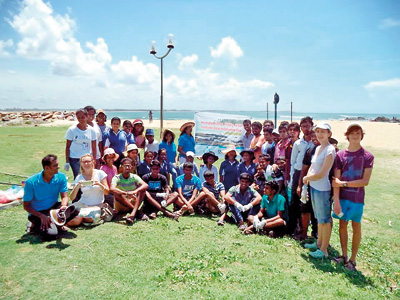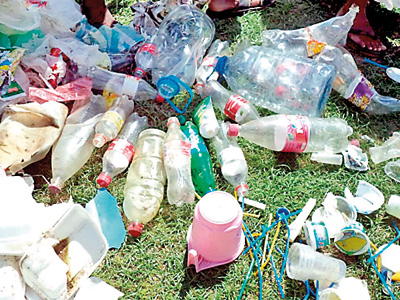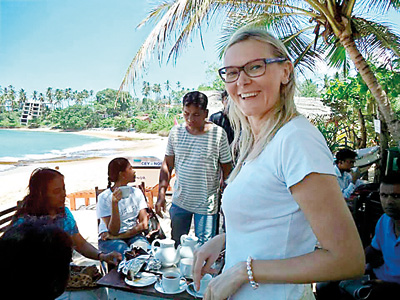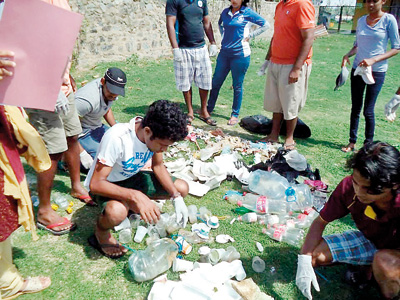Giving nature a voice and educating youngsters on plastic waste
View(s):Founder of Jo Kaminska Foundation (JKF), Joanna Ruda, has been running educational programmes about plastic pollution in the country. It’s almost 3 years now since she began her initiative, working with organizations and local communities to spread awareness about plastic pollution and suggests ways to combat this global problem on an individual level.

Volunteers at the Tangalle beach clean up
Joanna who began her career as teacher, translator and an interpreter, took to designing and producing jewellery six years back and came to Sri Lanka first to buy stones, then fell in love with the country and kept coming every year. When she set up her foundation she decided that Sri Lanka was going to be the first country for her educational programme.
Here she shares some of her thoughts on what got her started on her foundation and how her beach clean-up and environmental initiatives have been progressing.
How did the Jo Kaminska Foundation come about and why environmental issues?
When I went to buy my first stones directly from a mine, I did not want to buy them from shops or from dealers. I bought my first stones from Brazilian miners and saw the village and how families of the miners lived. The price a client pays for a finished piece of jewellery in a shop is often extremely high, but the people who are directly responsible for the beauty of the stones are the miners and gem cutters and they get the smallest part.
That’s when I began to think back to those communities and what I could give back. Not money, as it might not make any difference on a community level, instead – education. I used to be a teacher and I believe that it’s only education that can change the world. When I finally set up the Foundation, which was almost 3 years ago I knew I wanted to include art in the programme. Art enhances imagination, gives people freedom and fosters their creativity.

Plastic bottles collected from the beach
Why environmental issues?
First of all, because nature does not have a voice, or better said, it has a voice, but we forget how to listen to it. Secondly plastic pollution is an environmental disaster and a global problem, but for some reasons almost nobody talks about it. Sri Lanka is a paradise, but it can be lost soon if we don’t act.
There are separate organizations in the world dealing with plastic pollution, single people taking individual actions, but nothing has been done so far on a global level to face this huge problem. Oceans are dying, over 1 000 000 animals die every year because they have eaten plastic or got tangled in it, turtles, birds, fish, whales with dozens of plastic bags in their stomachs, but people don’t know much or anything about it. Blindly buying new plastic things which will break down soon and won’t be mended, substituting the natural materials that have been used for generations with plastic, accepting carrots or bananas on plastic trays covered with plastic film, which don’t have any purpose and will serve only to be taken home and all the packaging will be thrown away and will stay in the environment for at least 20 years.
A plastic bottle that we throw away without recycling will remain in the environment for another 450 years.
Tell us about the Jo Kaminska ethical jewellery line ?
Ethical jewellery is a relatively new trend which began about 10 years ago. There are different forms of it, some designers produce jewellery only from recycled metals, some manage to get ethical gold from small cooperative mines, some involve in social projects. In my case I source most of my gems from ethical sources where there is no child labour, gem miners and cutters are treated and paid accordingly, there is respect for the land. Ten percent of the revenues goes to sponsor the educational programmes run by Jo Kaminska Foundation.

Joanna (Right)
Beach clean ups – how many have you done ?
In which areas ?
The first Beach Cleanup we organised took place in Galle last October.
For the first clean up we had about 60 volunteers who turned up – 40 were local community members, mothers with their children came to help to clean and young people.
The recently concluded Tangalle Beach Cleanup was our second. It was a joint initiative with the Ocean University of Sri Lanka in Tangalle. The response from the students and the staff was amazing. The whole initiative lasted three days. It included a lecture, students prepared informative posters and distributed them in town together with the leaflets. In Tangalle in total we had about 150 volunteers and we cleaned two beaches.
When you talk to people and show them what really happens with plastic when it’s not collected and recycled, they understand and they are eager to join the initiative. Of course you will find people who say they will come and never appear, or others who simply don’t care, but in general the response I have seen has been amazing. I hope next time we will be able to attract even more people. In general children and young people are very eager to join the initiative and they understand the reasons, you don’t have to explain much. I think the initiative should be repeated in the same place to activate more people from the local community.
 Having begun the beach clean ups have you noticed a change of perspective ?
Having begun the beach clean ups have you noticed a change of perspective ?
People who see the photos of what happens with plastic when it gets into the ocean or stays on the land are always shocked. When they hear the numbers, they can’t believe that not much has been done to combat the problem. However, one of the primary goals of the initiative is to make people realize that they have a choice, that whatever they decide to do in life has an impact on the environment and their closest surrounding. There is hope, but we can’t forget we are talking about a change of habits and this can take quite a while to happen. If we had support from the government I know the process would be faster and the results would be visible faster. During one of the workshops one of the participants in their feedback wrote: Today I understood that as an individual I can change the world around me, and I can do it now. And this sentence for me is precious. There is hope and we will be working towards our goals.
The foundation conducts awareness programmes as well?
We have organized workshops for 165 schools from the Southern Province (Gall, Matara, Tangalle and Hambantota) and ran the same programme in Hilburn Colleges in Avisawella and Balangoda. Primary and secondary students have been involved. Last year we had a pilot exchange programme between the school in Avisawella and a school from Lodz in Poland. Students exchanged artwork and written texts about plastic pollution in their respective countries and exhibitions have been organized in both schools. For this year with the Ocean University we have plans to implement the programme in other areas in Sri Lanka.
How successful have the awareness programmes been especially since it uses artistic means to get across your message ?
I think art is very powerful. In the programme, I use story telling, art activities and problem solving for older students. Any of these forms influence imagination. Sometimes not many words are necessary to convey the message and make it stay in the memory for a long time. An image very often is stronger than 100 words. And when I talk about an image I also mean the image we create in our mind when listening to a story, for example. People all over the world love stories. Sri Lanka is a land of storytellers, so let’s use stories to tell people what is really going on with Nature when we don’t look after it the way we should.
When is your next beach clean up ?
We have talked about a special programme with the Ocean University in Tangalle prepared by the students for the local schools first and later to join forces and clean the beach.
In August/ September we are planning a bigger initiative in Kandy. We would like to support some local activists from that area whom I was honoured to meet. We forget that a lot of rubbish we get on Sri Lankan beaches and in the ocean comes from the land, from all different places all over the country. Plastic items travel in rivers, it’s carried by the wind, with the monsoon it is washed into the coastal area. We hope to extend this programme to the whole country to see its long lasting results.
To support this initiative or for more information log onto https://www.facebook.com/JoKaminska EthicalJewellery


